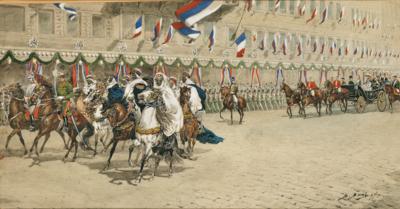Vasily Karlovich Zal (Vasily Karlovich Zal)
(St. Petersburg 1871–1919)
Algerian Spahis on the Rue de Rivoli during a procession on the occasion of Czar Nicholas II’s visit to Paris in October 1896, signed in Cyrillic, dated V. Sal (18)97, ink, pen, watercolour, opaque white on paper laid down on board, 33 x 62.3 cm, mounted, framed
Provenance:
Private Collection Vienna;
Sale, Dorotheum, Vienna, 22 September 1970, lot 164 (French, late 19th century);
Private Collection Austria.
We are grateful to Dr. Olga Sugrobova-Roth for her scholarly advice.
Russian Czar Nicholas II (1868-1918) travelled to Paris with his wife Alexandra Fyodorovna (1872-1918) in the autumn of 1896, where he was received by French President Félix Faure (1841-1899) in order to strengthen Franco-Russian relations. Nicholas II had succeeded his father Alexander III (1845-1894) to the Russian throne only two years earlier. During his visit to Paris on 7 October 1896, he took part in laying the foundation stone of the Pont Alexandre III, the magnificent bridge over the Seine that connects the Invalides with the Grand Palais and the Petit Palais, named in honour of his father.
The gala exit depicted here shows the Czar, his wife and the French President in a plain black Landau. The splendid buildings, decorated with French flags, of the famous Rue de Rivoli, which leads past the Louvre and the Tuileries, are recognisable in the background. It is striking that the equipage of state guests is only discernible at the far right edge of the picture. Instead, the artist has placed the Czar’s guard of honour at the centre of the painting, consisting of Arab and Tunisian chieftains dressed in splendid robes.
Specialist: Mag. Barbara Hagerty
 Mag. Barbara Hagerty
Mag. Barbara Hagerty
+43-1-515 60-736
barbara.hagerty@dorotheum.at
25.04.2024 - 18:00
- Realized price: **
-
EUR 3,120.-
- Estimate:
-
EUR 1,000.- to EUR 1,500.-
Vasily Karlovich Zal (Vasily Karlovich Zal)
(St. Petersburg 1871–1919)
Algerian Spahis on the Rue de Rivoli during a procession on the occasion of Czar Nicholas II’s visit to Paris in October 1896, signed in Cyrillic, dated V. Sal (18)97, ink, pen, watercolour, opaque white on paper laid down on board, 33 x 62.3 cm, mounted, framed
Provenance:
Private Collection Vienna;
Sale, Dorotheum, Vienna, 22 September 1970, lot 164 (French, late 19th century);
Private Collection Austria.
We are grateful to Dr. Olga Sugrobova-Roth for her scholarly advice.
Russian Czar Nicholas II (1868-1918) travelled to Paris with his wife Alexandra Fyodorovna (1872-1918) in the autumn of 1896, where he was received by French President Félix Faure (1841-1899) in order to strengthen Franco-Russian relations. Nicholas II had succeeded his father Alexander III (1845-1894) to the Russian throne only two years earlier. During his visit to Paris on 7 October 1896, he took part in laying the foundation stone of the Pont Alexandre III, the magnificent bridge over the Seine that connects the Invalides with the Grand Palais and the Petit Palais, named in honour of his father.
The gala exit depicted here shows the Czar, his wife and the French President in a plain black Landau. The splendid buildings, decorated with French flags, of the famous Rue de Rivoli, which leads past the Louvre and the Tuileries, are recognisable in the background. It is striking that the equipage of state guests is only discernible at the far right edge of the picture. Instead, the artist has placed the Czar’s guard of honour at the centre of the painting, consisting of Arab and Tunisian chieftains dressed in splendid robes.
Specialist: Mag. Barbara Hagerty
 Mag. Barbara Hagerty
Mag. Barbara Hagerty
+43-1-515 60-736
barbara.hagerty@dorotheum.at
|
Buyers hotline
Mon.-Fri.: 10.00am - 5.00pm
kundendienst@dorotheum.at +43 1 515 60 200 |
| Auction: | 19th Century Paintings |
| Auction type: | Saleroom auction with Live Bidding |
| Date: | 25.04.2024 - 18:00 |
| Location: | Vienna | Palais Dorotheum |
| Exhibition: | 13.04. - 25.04.2024 |
** Purchase price incl. charges and taxes
It is not possible to turn in online buying orders anymore. The auction is in preparation or has been executed already.

